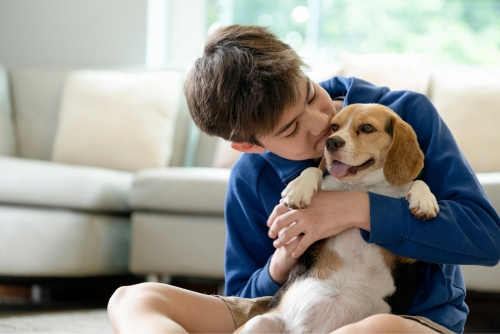When Dallas-Fort Worth dog owners approach training, they typically rely on food-based rewards like treats. However, treats aren’t the only reward to offer when teaching your dog commands and fostering obedience. What does training dogs in DFW look like with non-food rewards? Why is it important to create a varied reward system? Read on to find out.
Why Incorporate Non-Food Rewards
Every dog is a little bit different, and some may not be what we refer to as “food-motivated.” In other words, they eat when they’re hungry, but they aren’t driven to perform for food and may not respond to your training efforts in exchange for treats.
Even food-motivated dogs can benefit from receiving non-food rewards. Your dog’s weight can play a major role in her overall health, and overdoing it on the treats can cause unwanted weight gain or prohibit necessary weight loss.
Plus, you may not always have treats or dog-appropriate food on hand. It’s important for your dog to respect your authority at all times, whether you’re out on a walk, playing in the backyard, or visiting the vet. By getting her accustomed to non-food rewards, you ensure that she’s motivated to behave in any situation.
Non-Food Rewards to Try
Because so many popular training methods rely on food rewards, you’re probably wondering what you could offer up that your dog would want just as badly as something tasty. Fortunately, even treat lovers crave other things, like praise, affection, and playtime.
Your dog is more attuned to your emotional state than you may realize. Chances are high that when you use a stern tone of voice, she stops what she’s doing, puts her ears back against her head, and maybe even rolls over to expose her belly—all signs that she knows you’re unhappy.
If she responds to a command properly and you offer her words of affirmation, pet her, or give her permission to pick up a favorite toy, she senses that she’s made you happy. This positive response is very motivating for dogs that have a strong bond and sense of secure attachment with their owners. In this instance, you’ll likely notice that she wags her tail, relaxes her ears, and seeks physical touch.
Phasing in Non-Food Rewards
If your dog is accustomed to receiving treats while training, you may need to phase in non-food rewards rather than make the switch overnight. A sudden withdrawal of food-based rewards may demotivate or confuse her.
Give her a treat when she responds to a command the first time. Then, make sure that any other treats are out of sight, preferably in a sealed bag or container so that her powerful nose can’t detect them. The second time she responds to a command, offer one of the non-food rewards mentioned above. Repeat this pattern, slowly using more non-food rewards than treats until she sees both as equally valuable.
Some dogs may struggle with this transition more than others. For professional dog training in DFW, come to ADU.



